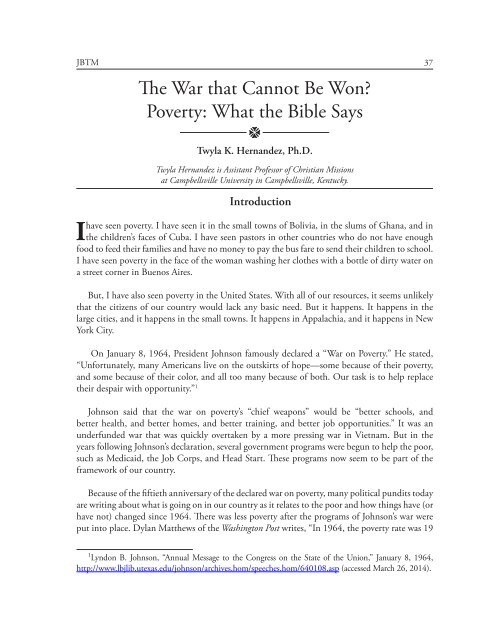JBTM_10-2_Fall_2013
JBTM_10-2_Fall_2013
JBTM_10-2_Fall_2013
You also want an ePaper? Increase the reach of your titles
YUMPU automatically turns print PDFs into web optimized ePapers that Google loves.
<strong>JBTM</strong><br />
The War that Cannot Be Won?<br />
Poverty: What the Bible Says<br />
37<br />
Twyla K. Hernandez, Ph.D.<br />
Twyla Hernandez is Assistant Professor of Christian Missions<br />
at Campbellsville University in Campbellsville, Kentucky.<br />
Introduction<br />
have seen poverty. I have seen it in the small towns of Bolivia, in the slums of Ghana, and in<br />
I the children’s faces of Cuba. I have seen pastors in other countries who do not have enough<br />
food to feed their families and have no money to pay the bus fare to send their children to school.<br />
I have seen poverty in the face of the woman washing her clothes with a bottle of dirty water on<br />
a street corner in Buenos Aires.<br />
But, I have also seen poverty in the United States. With all of our resources, it seems unlikely<br />
that the citizens of our country would lack any basic need. But it happens. It happens in the<br />
large cities, and it happens in the small towns. It happens in Appalachia, and it happens in New<br />
York City.<br />
On January 8, 1964, President Johnson famously declared a “War on Poverty.” He stated,<br />
“Unfortunately, many Americans live on the outskirts of hope—some because of their poverty,<br />
and some because of their color, and all too many because of both. Our task is to help replace<br />
their despair with opportunity.” 1<br />
Johnson said that the war on poverty’s “chief weapons” would be “better schools, and<br />
better health, and better homes, and better training, and better job opportunities.” It was an<br />
underfunded war that was quickly overtaken by a more pressing war in Vietnam. But in the<br />
years following Johnson’s declaration, several government programs were begun to help the poor,<br />
such as Medicaid, the Job Corps, and Head Start. These programs now seem to be part of the<br />
framework of our country.<br />
Because of the fiftieth anniversary of the declared war on poverty, many political pundits today<br />
are writing about what is going on in our country as it relates to the poor and how things have (or<br />
have not) changed since 1964. There was less poverty after the programs of Johnson’s war were<br />
put into place. Dylan Matthews of the Washington Post writes, “In 1964, the poverty rate was 19<br />
1 Lyndon B. Johnson, “Annual Message to the Congress on the State of the Union,” January 8, 1964,<br />
http://www.lbjlib.utexas.edu/johnson/archives.hom/speeches.hom/640<strong>10</strong>8.asp (accessed March 26, 2014).


